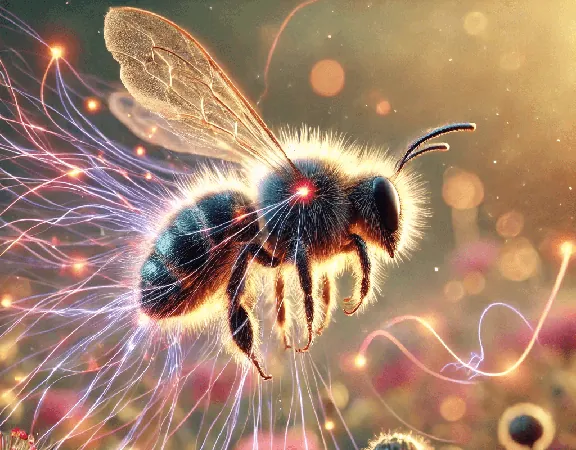
The Shocking Secret of Insect Navigation: How Electrostatic 'Thinking' is Revolutionizing Our Understanding of Nature
2024-11-04
Author: Ming
Introduction
In a fascinating revelation that challenges our perception of the natural world, researchers have delved into the intricate lives of insects, particularly bees, uncovering their unique ability to perceive static electricity—an invisible force that could play a critical role in their navigation and survival.
The Inquiry into Bees' Unique Senses
For years, the inquiry into whether bees possess a heightened sense that humans lack has intrigued biologists. This question arises from the sheer dominance of static electricity that bees accumulate during flight, akin to the charge one experiences after scuffling across a carpet in thick socks. This charge may endow them with the ability to detect and interact with objects in their environment in ways we are just beginning to understand.
Groundbreaking Research by Daniel Robert
In 2013, groundbreaking research led by Daniel Robert, a sensory ecologist from the University of Bristol, marked a paradigm shift in this field. His team discovered that bees can not only detect but also discern between electric fields emanating from flowers. This revelation suggested that these electrostatic signals could be a vital tool for bees, possibly facilitating flower selection and foraging practices.
Expanding Understanding of Static Electricity's Role
Fast forward to 2024, and Robert's lab has further expanded our understanding, revealing that static electricity plays a role in attracting pollen to various pollinators, including butterflies and moths, while also assisting caterpillars in evading predators. This line of inquiry is pivotal, as it extends beyond understanding the ecological ramifications of static charges. The research raises compelling questions about the evolutionary significance of this electric sense. Could electrostatics be a determining factor in how these small creatures find food, navigate their habitats, and interact with their environment?
Implications for Evolution and Survival
Experts believe this understanding of electrostatic perception may shed light on the evolutionary pressures that have shaped these creatures over millions of years. The ability to sense electric fields could enhance their survival strategies, offering them advantages in foraging and evasion from threats.
Broader Implications and Future Research
As scientists continue to unlock the secrets of insect navigation, the implications of these studies could pave the way for innovative approaches in conservation efforts, agriculture, and even robotics, mimicking nature's strategies in engineering solutions.
Conclusion
So, the next time you see a bee buzzing around, remember: they may be tuned into an unseen world of static electricity that enables them to thrive in ways we have yet to fully grasp!


 Brasil (PT)
Brasil (PT)
 Canada (EN)
Canada (EN)
 Chile (ES)
Chile (ES)
 Česko (CS)
Česko (CS)
 대한민국 (KO)
대한민국 (KO)
 España (ES)
España (ES)
 France (FR)
France (FR)
 Hong Kong (EN)
Hong Kong (EN)
 Italia (IT)
Italia (IT)
 日本 (JA)
日本 (JA)
 Magyarország (HU)
Magyarország (HU)
 Norge (NO)
Norge (NO)
 Polska (PL)
Polska (PL)
 Schweiz (DE)
Schweiz (DE)
 Singapore (EN)
Singapore (EN)
 Sverige (SV)
Sverige (SV)
 Suomi (FI)
Suomi (FI)
 Türkiye (TR)
Türkiye (TR)
 الإمارات العربية المتحدة (AR)
الإمارات العربية المتحدة (AR)